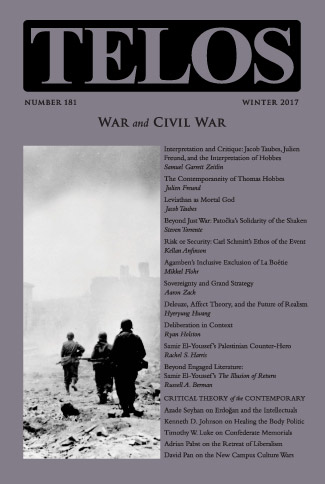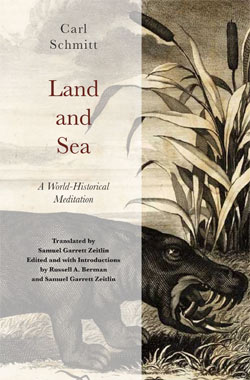By Kellan Anfinson · Thursday, February 22, 2018 Kellan Anfinson’s “Risk or Security: Carl Schmitt’s Ethos of the Event” appears in Telos 181 (Winter 2017). Read the full article at the Telos Online website, or purchase a print copy of the issue in our online store. Individual subscriptions to Telos are now available in both print and online formats.
This article audits Schmitt’s theory of politics through the concept of the event, particularly the risk it entails. I use Deleuze and Guattari’s notion of a “machine” to build on Michael Marder’s reading of the event in Schmitt, which envisions politics as unstable and open to transformation. Attending to flashpoints where Schmitt limits the potential of these transformations reveals two ways of orienting oneself toward political events: security or risk. Schmitt pushes decisions in the direction of security. But according to Schmitt’s argument that definitions of the political are also political, Schmitt’s attempt to limit the shape that political transformations take is polemical rather than analytical. Reading his theoretical analysis against such polemical interjections reveals the possibility of political partisanship as civil disobedience in which one gives up security and accepts the risk of placing oneself outside the legal order.
Continue reading →
By Aaron Zack · Thursday, January 18, 2018 Aaron Zack’s “Sovereignty and Grand Strategy: Some Observations on the Rise of China and Decline of the Americans” appears in Telos 181 (Winter 2017). Read the full article at the Telos Online website, or purchase a print copy of the issue in our online store. Individual subscriptions to Telos are now available in both print and online formats.
The rise and decline of great powers are not solely material in nature but also moral, political, and cultural. Many modern theorists emphasize the material factors in rise and decline, but older political thinkers focused on moral-political explanations. Carl Schmitt defines the essence of the political as the distinction between friend and enemy. A rising sovereign will effectively distinguish between friends and enemies and act in the interest of a political community. A decaying sovereign will gradually lose its capacity to both make a rational distinction between friends and enemies and act in the interest of the (fading) political community. True grand strategy therefore depends upon a robust sovereign—a decayed sovereign faces difficulty in implementing an effective or optimal grand strategy.
Continue reading →
By Russell A. Berman · Wednesday, December 13, 2017 Telos 181 (Winter 2017): War and Civil War is now available for purchase in our store.
 Consider the question: has American political life ever been as polarized as it is today? If the most appropriate answer is: yes, of course, in 1861, then the problem has been named and we are left with little comfort. The evaporation of anything like a bipartisan consensus in the political class leaves us staring at a battlefield, with few common bonds or shared attachments. Politics has become the internalization of war by other means. This is our version of the crisis of parliamentary democracy that Schmitt described in the Weimar years. Congressional Democrats are unwilling to cross the aisle to find room for compromise in the Trump era, but this only repeats the animosity among Republicans toward the Obama agenda eight years ago. Each party seeks its own advantage, which exclusively means the other party’s disadvantage, as the national good slips beneath the horizon. Each party focuses on mobilizing its base for votes and fund-raising, which means that each has an irresistible incentive to avoid solving those problems that are the most effective vehicles for rallying their supporters: when they held the majority, the Democrats preferred to keep the “dreamers” vulnerable, so as to be able to recycle them in future campaigns, just as the Republicans chose to punt on health care. Each issue is too successful in attracting voters, too valuable to give up. Consider the question: has American political life ever been as polarized as it is today? If the most appropriate answer is: yes, of course, in 1861, then the problem has been named and we are left with little comfort. The evaporation of anything like a bipartisan consensus in the political class leaves us staring at a battlefield, with few common bonds or shared attachments. Politics has become the internalization of war by other means. This is our version of the crisis of parliamentary democracy that Schmitt described in the Weimar years. Congressional Democrats are unwilling to cross the aisle to find room for compromise in the Trump era, but this only repeats the animosity among Republicans toward the Obama agenda eight years ago. Each party seeks its own advantage, which exclusively means the other party’s disadvantage, as the national good slips beneath the horizon. Each party focuses on mobilizing its base for votes and fund-raising, which means that each has an irresistible incentive to avoid solving those problems that are the most effective vehicles for rallying their supporters: when they held the majority, the Democrats preferred to keep the “dreamers” vulnerable, so as to be able to recycle them in future campaigns, just as the Republicans chose to punt on health care. Each issue is too successful in attracting voters, too valuable to give up.
Continue reading →
By Erik Pomrenke · Tuesday, September 26, 2017 As an occasional feature on TELOSscope, we highlight a past Telos article whose critical insights continue to illuminate our thinking and challenge our assumptions. Today, Erik Pomrenke looks at Adam Kotsko’s “On Agamben’s Use of Benjamin’s ‘Critique of Violence'” from Telos 145 (Winter 2008).
“On Agamben’s Use of Benjamin’s ‘Critique of Violence'” represents an illuminating attempt by Adam Kotsko to reassert the primacy of Walter Benjamin over Carl Schmitt in Giorgio Agamben’s work. These two thinkers serve alongside Heidegger, Aristotle, Foucault, and Arendt as the center of Agamben’s genealogy of bare life; as such, configuring this constellation correctly is of signal importance to the reception of Agamben’s Homo Sacer project. Kotsko contends that Benjamin’s primacy is both a theoretical and chronological matter.
Continue reading →
By David Pan · Thursday, September 14, 2017 The following paper was presented at the conference “After the End of Revolution: Constitutional Order amid the Crisis of Democracy,” co-organized by the Telos-Paul Piccone Institute and the National Research University Higher School of Economics, September 1–2, 2017, Moscow..
The idea of liberal democracy only makes sense because of a basic contradiction between liberalism and democracy. As a description of a form of government, democracy designates a government by the people, whose decision-making power would not be restricted by any higher authority. The power of democracy derives from its ability to mobilize a majority of the members of a political order for collective goals. This rule by popular will can also entail a freedom from higher authorities, including such entities like monarchs and aristocrats, but also ecclesiastical or moral authorities that would establish basic values for guiding decision-making. Since democracy alone would lack constraints on the popular will, liberalism, as a set of principles that include protection of minorities and freedom of expression, is needed to provide the limitations on democratic decision-making that protect democracy from erratic and changes in the public mood. As such, liberalism sets a limit on democratic power, and the basic contradiction between democracy and liberalism maintains a dynamic equilibrium between popular will and liberal principles that can be stabilizing due to its flexibility.
Continue reading →
By Telos Press · Wednesday, September 6, 2017 In a new review essay in Thesis Eleven, Peter Murphy writes about Carl Schmitt’s Land and Sea: A World-Historical Meditation, translated into English by Samuel Garrett Zeitlin and published by Telos Press Publishing. Purchase your copy of Schmitt’s Land and Sea in our online store and save 20% by using the coupon code BOOKS20.
An excerpt from the review:
 Samuel Zeitlin’s adroit, elegant translation of Carl Schmitt’s Land and Sea is sparkling to read. The book moves along with great energy, vibrant economy, and penetrating succinctness. The translation deftly conveys a book that is as short and direct as it is world-historical in scope. Its inquisitive reach expands as its flinty prose shrinks to the point of pithy, terse deliberateness. In 100-odd crisp pages it moves with panoptic concision from the ‘Potamic’ river cultures of the Middle East to the inland sea of the Mediterranean and across the oceans of modernity. The volume is beautifully produced by Telos Press. Samuel Zeitlin’s adroit, elegant translation of Carl Schmitt’s Land and Sea is sparkling to read. The book moves along with great energy, vibrant economy, and penetrating succinctness. The translation deftly conveys a book that is as short and direct as it is world-historical in scope. Its inquisitive reach expands as its flinty prose shrinks to the point of pithy, terse deliberateness. In 100-odd crisp pages it moves with panoptic concision from the ‘Potamic’ river cultures of the Middle East to the inland sea of the Mediterranean and across the oceans of modernity. The volume is beautifully produced by Telos Press.
Continue reading →
|
|









